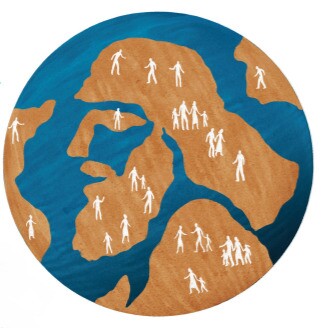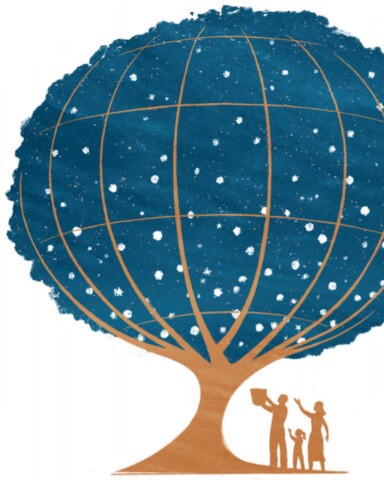In recent years, our beloved prophet, President Russell M. Nelson, has emphasized repeatedly the importance of the gathering of Israel and the role the Latter-day Saints are to play in this divinely-orchestrated effort. In President Nelson’s words, the gathering is “the greatest challenge, the greatest cause, and the greatest work on earth today.”1
A “Covenant Consciousness”
During my first few years as a professor of ancient scripture at Brigham Young University, I was asked to teach many courses in the Book of Mormon. In one of my large freshman Book of Mormon classes, I was startled by a question from a bright young woman who had grown up in the Church and had been well-educated about the gospel. We were about two-thirds of the way through the second semester of the Book of Mormon when she said, “Brother Millet, you continue to use a phrase that I don’t understand, and perhaps there are others in the class who have the same problem. You keep referring to ‘the house of Israel.’ What do you mean? What is the house of Israel?”
For a full 10 seconds I stood in amazement. It had never occurred to me at this point in the second half of a two-semester course that I needed to define something so fundamental.
Sometimes I sense among members of the Church a lack of what might be called “covenant consciousness.” I’m not referring here to the covenants and ordinances required for salvation, but rather a lack of feeling appropriate kinship and identity with ancient Israel and particularly with Abraham, Isaac, and Jacob. I fear that we may be losing an inner awareness of what it means to be a chosen people, a covenant people.
The Abrahamic Covenant

The Abrahamic covenant is an important aspect of the new and everlasting covenant—meaning, the fulness of the gospel of Jesus Christ (Doctrine and Covenants 133:57).2
God entered into a covenant with Abraham, promising him that if he and his posterity would keep the commandments and remain aloof from the ways of the world, that posterity would receive the gospel (compare Galatians 3:8), the priesthood, eternal life, and a land of inheritance. Abraham was promised that his posterity would be as numerous as the dust of the earth, the sand upon the seashore, or the stars in the heavens (Genesis 13:14–16; Genesis 15:1–6; Joseph Smith Translation, Genesis 17:8–10; Abraham 2:8–11, 19, 3:14). These are often called “the promises made to the fathers” (Doctrine and Covenants 2:2; 27:10; 98:32), inasmuch as they were perpetuated through Isaac, Jacob, Joseph, and their descendants. In order to ensure that descendants of Abraham would receive these supernal blessings, Abraham’s posterity has been scattered throughout the earth in order that the covenant people may serve as a leavening influence among all of God’s children.
The Restoration of the gospel of Jesus Christ entailed the restoration of the Abrahamic covenant. In September 1823, the angel Moroni appeared to the boy prophet, Joseph Smith. Of that visit Joseph wrote, “This messenger proclaimed himself to be an angel of God, sent to bring the joyful tidings that the covenant which God made with ancient Israel was at hand to be fulfilled, that the preparatory work of the Second Coming of the Messiah was speedily to commence; that . . . I was chosen to be an instrument in the hands of God to bring about some of His purposes in this glorious dispensation.”3
Joseph of old prophesied of his latter-day namesake that he would be a “choice seer,” one who would be raised up by God to bring the people of the last days to the knowledge of the covenants that God had made with the ancient fathers—Abraham, Isaac, and Jacob (2 Nephi 3:7). In an important sense, Joseph Smith was called to be a modern Abraham. On April 3, 1836, the Savior appeared and accepted the Kirtland Temple. In addition, Moses, Elias, and Elijah appeared. Of the keys that Elias restored, the scriptural account explains that “After this [Moses’s restoration of the keys of the gathering of Israel], Elias appeared, and committed the dispensation of the gospel of Abraham,4 saying that in us and our seed all generations after us should be blessed” (Doctrine and Covenants 110:12; emphasis added). And, as we will see shortly, what is true in regard to the Prophet Joseph’s lineage and the blessings to which Joseph is entitled is equally true for members of the Lord’s restored Church. Indeed, the Lord spoke of His Latter-day Saints as “a remnant of Jacob, and those who are heirs according to the covenant” (Doctrine and Covenants 52:2).
► You may also like: Countdown to Conference: Follow President Nelson’s invitation to study covenant Israel with this free, daily study guide
The Scattering of Israel
Members of the house of Israel—ancient or modern—are scattered when they reject the Savior and His gospel and forsake the everlasting covenant. They are scattered, either as individuals or whole nations, when they forsake the Lord Jehovah, violate their covenants, stray from the ordinances, and thereby forfeit the right to receive the blessings promised to the descendants of Abraham. Anciently, the Israelites were scattered when they were conquered by other nations and removed from their homelands. In a more subtle way, people are as scattered today in regard to their identity—who they are and what they have been called upon to do—as they are due to their geography.
Speaking on behalf of Jehovah, Moses warned ancient Israel: “If thou wilt not hearken unto the voice of the Lord thy God, to observe to do all his commandments and his statutes which I command thee this day . . . [you will be] removed into all the kingdoms of the earth. . . . And the Lord shall scatter thee among all people, from the one end of the earth even unto the other; and there thou shalt serve other gods, which neither thou nor thy fathers have known” (Deuteronomy 28:15, 25, 64; emphasis added; see also Jeremiah 16:11–13). The people of God became scattered—alienated from Jehovah and the ways of righteousness, lost as to their identity as covenant representatives, and displaced from the lands set aside for their inheritance—because they forsook the God of Abraham, Isaac, and Jacob and partook of the worship and ways of unholy men and nations.
In writing of the ten northern tribes of Israel, those who became known as the “lost ten tribes,” Nephi stated that “it appears that the house of Israel, sooner or later, will be scattered upon all the face of the earth, and also among all nations. And behold, there are many [of the ten tribes] who are already lost from the knowledge of those who are at Jerusalem. Yea, the more part of all the tribes have been led away; and they are scattered to and fro upon the isles of the sea; and whither they are, none of us knoweth, save that we know they have been led away” (1 Nephi 22:3–4). Jacob, the younger brother of Nephi, prophesied that the mortal Messiah would come to the Jews: “But because of priestcrafts and iniquities, they at Jerusalem will stiffen their necks against him, that he be crucified. Wherefore, because of their iniquities, . . . they who shall not be destroyed shall be scattered among all nations” (2 Nephi 10:3, 5–6).
In addition, there are times when the Lord scatters or leads away certain branches of His chosen people to the “nethermost parts of the earth” in order to accomplish His purposes—to spread the influence and blessings of Abraham throughout the globe. This was the case with Lehi’s family—a branch of the tribe of Joseph who were led away from their homeland to another hemisphere (the New World), because of wickedness in the Old World. Jacob, son of Lehi, explained: “And now, my beloved brethren, . . . we have been driven out of the land of our inheritance [the land of Israel]; but we have been led to a better land. . . . For behold, the Lord God has led away [groups of people] from time to time from the house of Israel, according to his will and pleasure. And now behold, the Lord remembereth all them who have been broken off, wherefore he remembereth us also” (2 Nephi 10:20–22; see also 1 Nephi 17:36–38).
The Gathering of Israel
When people are gathered, they are called out of Babylon into Zion, are enabled to congregate with the faithful, and are prepared and made worthy to receive the highest of all earthly blessings. Individuals were gathered in ancient days when they aligned themselves with the people of God, with those who worshipped Jehovah and received the counsel and direction of the prophets. They were gathered when they gained a sense of tribal identity, when they came to know who they were and Whose they were. They were gathered when they settled on those lands designated as promised lands—lands set apart as sacred sites for people of promise.

The call to the dispersed of Israel has been and ever will be the same: “Turn, O backsliding children, . . . and I will take you one of a city, and two of a family, and I will bring you to Zion” (Jeremiah 3:14). That is, gathering is accomplished through individual conversion—through faith, repentance, baptism, and confirmation. People are gathered first spiritually and second temporally—first to the Lord, His doctrine, and His Church and then to the lands of their inheritance or to the congregations of the Saints (see 1 Nephi 10:14; 15:13–14; 2 Nephi 10:6–7; 30:5). As a modern Apostle put it, “It is not the place of gathering that will save the scattered remnants, but the message of salvation that comes to them in their Redeemer’s name. . . . Salvation is not in a place but in a person. It is in Christ.”5
Jacob reminded his people that the Lord God “has spoken unto the Jews, by the mouth of his holy prophets, even from the beginning down, from generation to generation, until the time comes that they [the Jews, or the house of Israel] shall be restored to the true church and fold of God; when they shall be gathered home to the lands of their inheritance, and shall be established in all their lands of promise” (2 Nephi 9:2; emphasis added). Of the eventual gathering of the Jews to the Holy Land, the risen Lord explained to the Nephites: “And it shall come to pass that the time cometh, when the fulness of my gospel shall be preached unto them; and they shall believe in me, that I am Jesus Christ, the Son of God, and shall pray unto the Father in my name” (3 Nephi 20:30–31; emphasis added).
As a kind of summary statement, President Spencer W. Kimball taught: “Now, the gathering of Israel consists of joining the true Church and . . . coming to a knowledge of the true God. . . . Any person, therefore, who has accepted the restored gospel, and who now seeks to worship the Lord in his own tongue and with the Saints in the nations where he lives, has complied with the law of the gathering of Israel and is heir to all of the blessings promised the Saints in these last days.”6
Our leaders have emphasized that the gathering of Israel is taking place on both sides of the veil—in both our mortal world and the postmortal spirit world. Any time an individual is being led to receive the fulness of the gospel, he or she is being gathered. As we invite friends or loved ones to investigate the message and blessings of the restored gospel, we are involved in gathering Israel. As we do family history research, prepare names for vicarious work to be performed in holy temples, and ensure that the appropriate ordinances are performed in behalf of those who have died, we are helping to gather Israel.

President Nelson has taught that “missionary work is only the beginning” to obtaining the blessings of Abraham, Isaac, and Jacob. He explained: “The fulfillment, the consummation, of those blessings comes as those who have entered the waters of baptism perfect their lives to the point that they may enter the holy temple. Receiving an endowment there seals members of the Church to the Abrahamic covenant.”7 While men and women begin to gather into the fold of modern Israel through conversion, the final phase of gathering occurs in holy temples. Elder Bruce R. McConkie pointed out that when a person is “married in the temple for time and for all eternity, each worthy member of the Church enters personally into the same covenant the Lord made with Abraham. This is the occasion when the promises of eternal increase are made, and it is then specified that those who keep the covenant made there shall be inheritors of all the blessings of Abraham, Isaac, and Jacob.”8
Coming to Know Who We Are
I was 14 years old when my father and I traveled about 50 miles to the home of our stake patriarch, Brother Clarence Murphy, to receive my patriarchal blessing. I was nervous, not quite sure of what was about to take place. I had heard Mom and Dad speak occasionally about their blessings, and more than one of my friends had shared with me what a spiritual experience it was for them. The patriarch chatted briefly with us. Then this elderly man stood, walked over to me, and placed his hands on my head. I closed my eyes and listened intently as a total stranger told me a whole host of things about myself—matters I needed to attend to right away; what I would be called upon to do in coming years; how crucial it was for me to read and search the pages of the Book of Mormon; and so forth. Brother Murphy seemed to be reading what President Harold B. Lee referred to as “paragraphs from the book of [my] possibilities.”9
At one point in the blessing, the patriarch spoke words that have burned in my bosom for decades. He stated soberly that “within your veins flows the blood of a royal lineage. You are heir to the blessings of Father Abraham through Ephraim, the second born of Joseph.” It is so very important for each of us to know who we are. First and foremost, we are the sons and daughters of God, our Heavenly Father. He is the Father of our spirits (Numbers 16:22; 27:16; Hebrews 12:9). Second, as we receive the fulness of the gospel of Jesus Christ and its ordinances and are born again, we become the sons and daughters of Jesus Christ by adoption (Mosiah 5:7–8; 27:23–26). Finally, we are the sons and daughters of Father Abraham and thus heirs to the supernal privileges and blessings promised to his descendants. “Once we know who we are and the royal lineage of which we are a part,” President Nelson observed, “our actions and our directions in life will be more appropriate to our inheritance.”10
In his final address to students at Brigham Young University, only months before his death, President Harold B. Lee told a simple story that has stayed with me from the time I first heard it in 1973. “I am reminded of the old court jester who was supposed to entertain his king with interesting stories and antics,” President Lee said. “He looked at the king who was lolling on his throne, a drunken, filthy rascal, [he] doffed his cap and bells, and said with a mock gesture of obeisance, ‘O king, be loyal to the royal within you.’”11 Such is our charge, our commission, our challenge, our opportunity, and our supernal privilege. That we may receive that sacred charge eagerly and earnestly, is my hope for each of us.
Illustrations by Alex Nabaum
This article was originally published on LDSLiving.com in March 2021.
Notes
1. “Hope of Israel,” Worldwide Youth Devotional, 3 June 2018.
2. See also Joseph Fielding Smith, Doctrines of Salvation, 3 vols., comp. Bruce R. McConkie (Salt Lake City: Bookcraft, 1954–56), 1:156–58.
3. Teachings of Presidents of the Church: Joseph Smith (Salt Lake City: The Church of Jesus Christ of Latter-day Saints, 2007), 439.
4. “Elias restored the great commission, given of God to Abraham our father, whereby the seed of Abraham has power to gain eternal blessings forever through eternal marriage; that is, Elias restored the marriage discipline that had eternal efficacy, virtue, and force in the days of Abraham, Isaac, and Jacob.” (Bruce R. McConkie, A New Witness for the Articles of Faith [Salt Lake City: Deseret Book, 1985], 508.)
5. Bruce R. McConkie, The Millennial Messiah: The Second Coming of Christ (Salt Lake City: Deseret Book, 1982), 200.
6. Teachings of Spencer W. Kimball, ed. Edward L. Kimball (Salt Lake City: Bookcraft, 1989), 439.
7. “Thanks for the Covenant,” 1988–89 BYU Devotional and Fireside Speeches (Provo, UT: BYU Publications, 1989), 59; see also Perfection Pending and Other Favorite Discourses by Russell M. Nelson (Salt Lake City: Deseret Book, 1998), 207.
8. A New Witness for the Articles of Faith, 508.
9. Stand Ye in Holy Places (Salt Lake City: Deseret Book, 1974), 117.
10. Perfection Pending, 208.
11. Harold B. Lee, “Be Loyal to the Royal Within You,” 1973 BYU Speeches of the Year (Provo, UT: Brigham Young University Press, 1974), 100.

